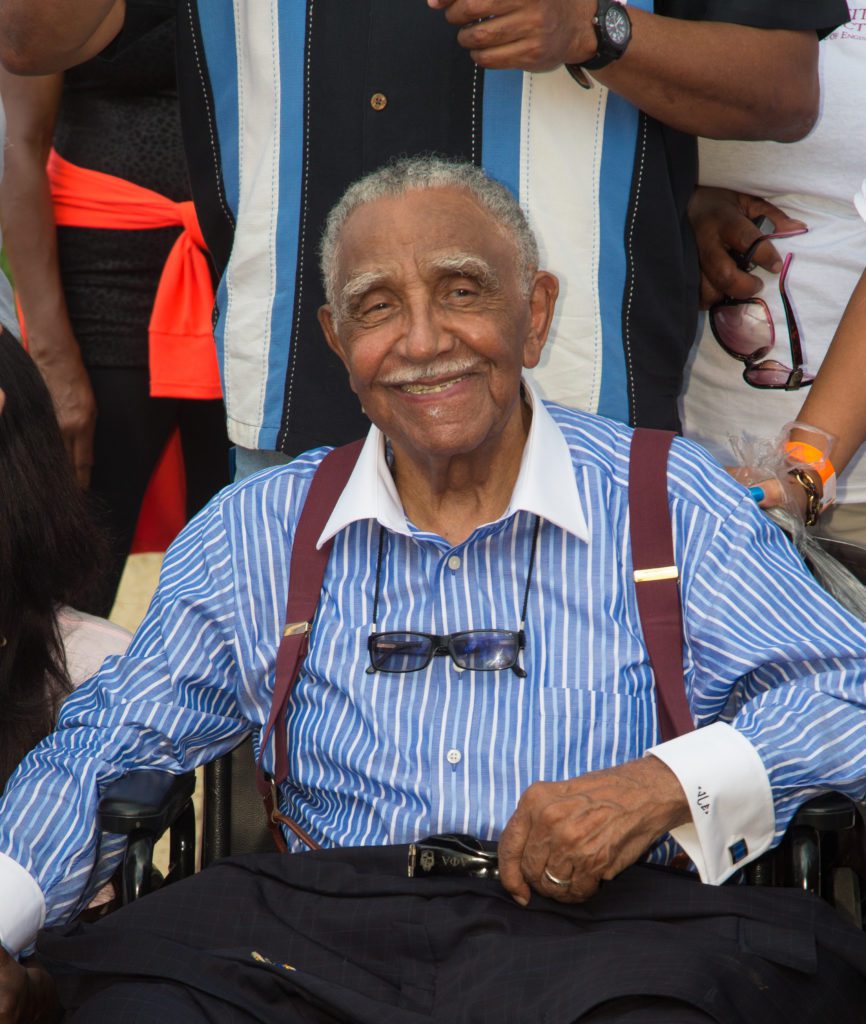Joseph Lowery: The Dean of Hope
By • April 7, 2020 0 1749

The Rev. Joseph E. Lowery had a sense of humor, but there was nothing funny about the life he lived — the life of a warrior. Known as the Dean of the Civil Rights Movement, he was the man of all men.
He was 11 years old when he realized that he was free but not free. One day in 1933, the innocent little black boy was leaving his daddy’s candy store when a white police officer approached him on the street. Without saying a word, he hit young Joseph in the stomach. “Get back, Nigger,” he said. “Don’t you see a white man coming in?”
Angry and scared, the boy ran home to get his father’s gun. Lowery told the story of planning to kill the white police office over and over for years. His father, Leroy, arrived home in time to stop him on the porch and ask why he was crying. When he told him what happened, his father removed the gun from his hands and explained to Joseph that it was wrong to kill any man. His father and his mother, Dora, calmed their son down and immediately made plans to get him out of town.
The Lowerys sent their son away from Huntsville, Alabama, where he was born in 1921, to live with family in Chicago. He finished middle school in Chicago, but returned home to attend high school. After graduation, he attended Knoxville College and Alabama A&M before transferring to and graduating from Paine College in Augusta, Georgia, in 1943.
While a student at Knoxville College, he married Agnes Moore. They had two sons, Joseph Jr. and Leroy III. Within three years, he found himself divorced and trying to save money for law school. Lowery moved to Birmingham in 1947 to write for a newspaper called the Birmingham Informer. During that time, he met and married a preacher’s daughter named Evelyn Gibson. They were married to each other and to the movement for 70 years.
No, the aspiring lawyer did not make it to law school. Instead, with encouragement from his father-in-law, he made the decision to become a preacher, attending Payne Theological Seminary, Wayne State University, Garrett Theological Seminary and the Chicago Ecumenical Institute. After finishing theological school, he preached at several churches in Alabama until he was transferred to Warren Street Methodist Church in Mobile in 1952.
As pastor of Warren Street Methodist, he, like many preachers, swung into action when Rosa Parks was arrested in Montgomery on Dec. 5, 1955. Many people don’t know that the young preacher headed the Alabama Civic Affairs Association, an organization devoted to the desegregation of buses and public places, long before the Rosa Parks incident.
Lowery knew what had to be done in Mobile. The bus boycott in Mobile was a huge success, so the leaders in Montgomery and Mobile joined forces and changed the course of history. Two years after Parks’s arrest, Martin Luther King Jr., Ralph Abernathy, Fred Shuttlesworth, Lowery and others founded the Southern Christian Leadership Conference. Dr. King was president and Lowery was vice president.
Like many Methodist preachers, Lowery often moved — to lead churches from Tennessee to Birmingham — but he never left the civil rights movement. If there was a call for justice, he was there. He attended the March on Washington and went to Birmingham after the four little girls were murdered. He marched in Selma and in hundreds of other marches leading to the passage of the Voting Rights Act.
It was three months after Dr. King’s death that the Rev. Lowery moved to Atlanta to preach at Atlanta’s Central United Methodist Church. He remained at Atlanta Central for 18 years, transferring in 1987 to Cascade United Methodist Church, where he stayed until his retirement in 1992.
In 1977, he would return to lead the people of SCLC after Abernathy’s departure, retiring in 1997. His fight for justice not only put his life, but the lives of his children and his wife in danger. In 1979, during a rally in Atlanta, the KKK shot into the car Evelyn Lowery was driving, missing her only by inches. Even the closest call with death did not stop the Lowerys. They both continued to march and speak out for justice, no matter the cost.
The fearless leader spoke out against the war in Iraq at Coretta Scott King’s funeral in 2006, with President and Mrs. Bush on the pulpit with him. When people criticized him for his words, he would not back down.
Neither growing old nor his outspokenness stopped him from becoming co-chair of Barack Obama’s voter registration committee. The next year, he headed to the inauguration to deliver the benediction for the first black president of the United States. His second trip to Washington that year was to receive the Presidential Medal of Freedom, with his wife by his side.
Four years later, their journey together would end when she died, on Sept. 26, 2013. He would live, fight for and defend us for another seven years. On March 27 of this year, the long life of the man people called the Dean of the Movement, the man who gave us hope, was over.
We will know about him via the Joseph & Evelyn Lowery Institute for Justice & Human Rights, led by his daughter Cheryl. If you travel to Atlanta, you will see Joseph E. Lowery Boulevard, which intersects with Ralph David Abernathy Boulevard. His life, well-lived, will linger for the ages and we continue to find hope in the lessons we learned from his journey.

